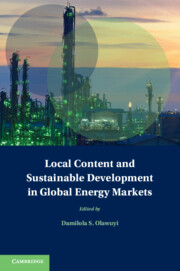Book contents
- Local Content and Sustainable Development in Global Energy Markets
- Reviews
- Treaty Implementation for Sustainable Development
- Local Content and Sustainable Development in Global Energy Markets
- Copyright page
- Contents
- Preface and Acknowledgements
- Abbreviations
- Editor
- Contributors
- Part I Introductory Context and Principles
- Part II Case Studies
- 6 Expressing Local Content through Black Economic Empowerment in the South African Petroleum Industry
- 7 Local Content Frameworks for Petroleum Industry Operations in the CEMAC Region: An Evaluation of Their Functionality, Sustainability and Normative Underpinnings
- 8 Local Content, Angolanização, and Sustainable Development in Angola
- 9 Local Content and the Sustainable Development of Oil and Gas Resources in Nigeria
- 10 Local Content Requirements and Treaty Implementation in Kenya’s Petroleum Sector
- 11 Sustainability and Local Content Requirements in Australian Oil and Gas Development: Has the Ship of Opportunity Sailed?
- 12 Local Content for Sustainable Development in Middle East and North Africa: Current Legal Approaches and Future Directions
- 13 Local Content and Sustainable Development in Norway
- 14 Local Content and Sustainable Development in Argentina
- 15 The Latin American Experience in Designing Local Content Policies in the Oil and Gas Sectors: Strengths, Limitations, and Future Perspectives
- 16 Local Content and Sustainable Development in Brazil
- 17 Industrial Policy and Local Content Rules in US Energy Policy
- 18 Oil and Gas Sector Local Content Decision Processes: Canadian Indigenous Participation
- Part III Lessons Learned and Future Directions
- Index
11 - Sustainability and Local Content Requirements in Australian Oil and Gas Development: Has the Ship of Opportunity Sailed?
from Part II - Case Studies
Published online by Cambridge University Press: 05 March 2021
- Local Content and Sustainable Development in Global Energy Markets
- Reviews
- Treaty Implementation for Sustainable Development
- Local Content and Sustainable Development in Global Energy Markets
- Copyright page
- Contents
- Preface and Acknowledgements
- Abbreviations
- Editor
- Contributors
- Part I Introductory Context and Principles
- Part II Case Studies
- 6 Expressing Local Content through Black Economic Empowerment in the South African Petroleum Industry
- 7 Local Content Frameworks for Petroleum Industry Operations in the CEMAC Region: An Evaluation of Their Functionality, Sustainability and Normative Underpinnings
- 8 Local Content, Angolanização, and Sustainable Development in Angola
- 9 Local Content and the Sustainable Development of Oil and Gas Resources in Nigeria
- 10 Local Content Requirements and Treaty Implementation in Kenya’s Petroleum Sector
- 11 Sustainability and Local Content Requirements in Australian Oil and Gas Development: Has the Ship of Opportunity Sailed?
- 12 Local Content for Sustainable Development in Middle East and North Africa: Current Legal Approaches and Future Directions
- 13 Local Content and Sustainable Development in Norway
- 14 Local Content and Sustainable Development in Argentina
- 15 The Latin American Experience in Designing Local Content Policies in the Oil and Gas Sectors: Strengths, Limitations, and Future Perspectives
- 16 Local Content and Sustainable Development in Brazil
- 17 Industrial Policy and Local Content Rules in US Energy Policy
- 18 Oil and Gas Sector Local Content Decision Processes: Canadian Indigenous Participation
- Part III Lessons Learned and Future Directions
- Index
Summary
Over the past forty years, Australia has considered the establishment of Local Content Requirements to encourage the sustainable development of its petroleum resources. In light of the likely development of a new frontier petroleum province in the Great Australian Basin, once again the role of the state and local content provisions has surfaced as an increasingly important debate in harnessing of LCRs as a regulatory tool for effective local content development. This chapter argues the role of LCRs function to facilitate and contribute to intergenerational equity in the establishment of sustainable industries on the back of petroleum development. LCRs, when harnessed effectively, may stimulate value creation and economic diversification and are thus essential to assist in the establishment and development of local industries in Australia. This chapter analyses the importance and role of LCRs in two parts. Firstly, it examines and critiques the historic ‘industry-based approach’ to local content requirements, focussing on the two Australian parliament reports from the 1989 and 1998. Secondly, it examines the contemporary approach to LCRs stimulated by the likely development of a new petroleum province in the Great Australian Bight, and the role they are likely to play in future petroleum development.
- Type
- Chapter
- Information
- Publisher: Cambridge University PressPrint publication year: 2021



